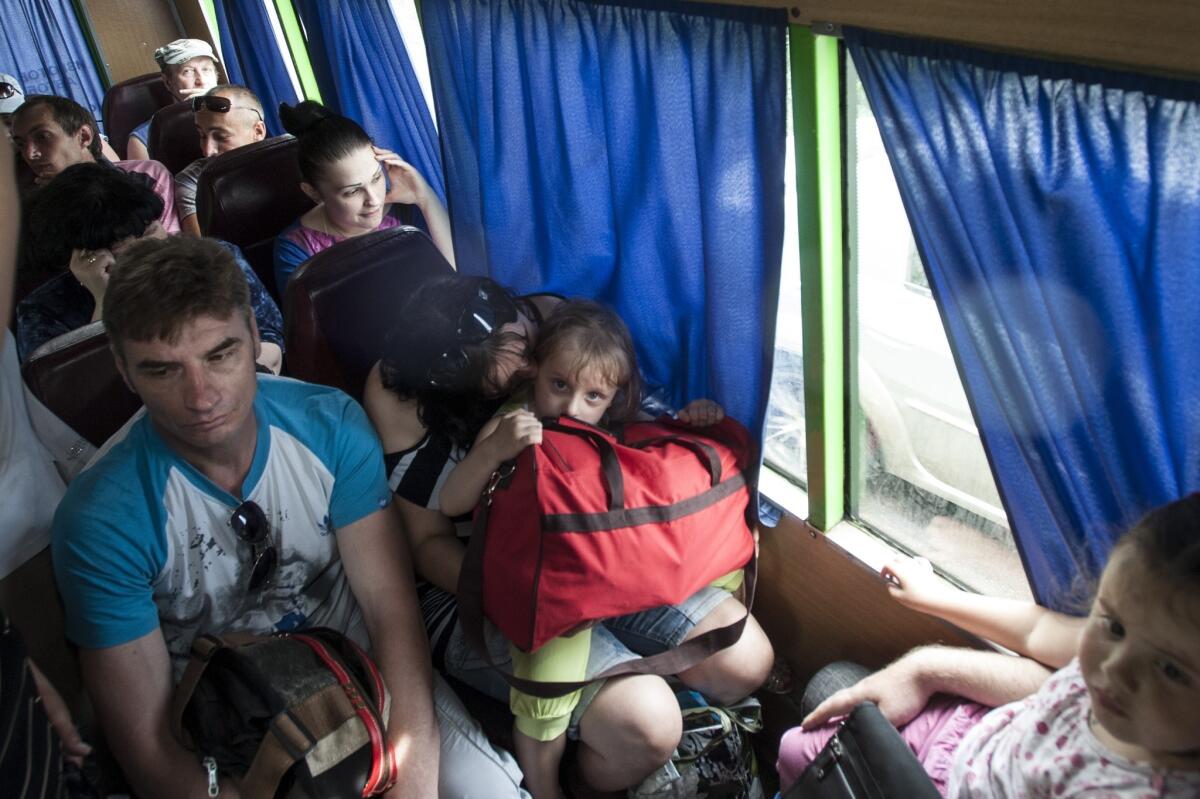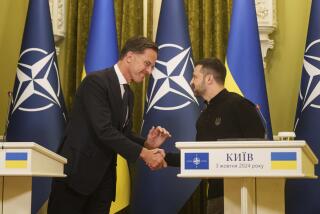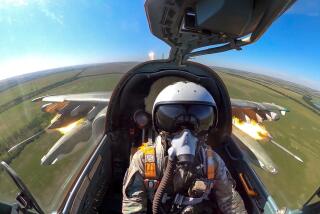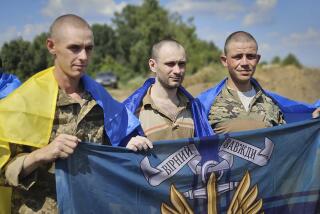Progress reported in Ukraine-Russia talks but fighting continues

Ukraine’s Foreign Ministry reported progress Monday after a second day of talks with a Moscow envoy aimed at ending the fighting between government forces and pro-Russia separatists in the east.
Violence continued, however, in the besieged, militant-occupied town of Slovyansk, demonstrating the virulence of the separatist movement, which appears to be spreading out of both Kiev’s and Moscow’s control.
Although details of the progress made in the peace talks were not released, Kiev media cited a Foreign Ministry statement that referred to a plan for bringing calm to the area.
“The sides reached a mutual understanding on key stages of the implementation of the plan and on a list of priorities which will contribute to a de-escalation of the situation in the Donetsk and Luhansk regions of Ukraine,” it said.
Newly inaugurated Ukrainian President Petro Poroshenko sent a message to the negotiators and their mediator from the Organization for Security and Cooperation in Europe that a halt to the armed clashes must be brought about right away.
“The situation where people die each day and Ukraine is paying such a high price is unacceptable,” Poroshenko said, the Interfax-Ukraine news agency reported.
The mediating role by OSCE veteran Heidi Tagliavini, a Swiss diplomat with experience negotiating security agreements in neighboring Georgia and Russia’s rebellious Chechnya republic, could boost the chances for success in the talks, as the 57-member alliance is the only security forum that includes Russia and Ukraine.
Russia is represented by its ambassador to Ukraine, Mikhail Zurabov, and Ukraine by its Berlin envoy, Pavlo Klimkin, the latter probably providing a window on the talks to the European Union.
It is the desire by western Ukrainians to orient their economy and diplomacy to the West that has angered Russian President Vladimir Putin and stirred up secessionist actions in Ukraine’s east, where Russian is widely spoken and much of the economy is intricately linked with that of Russia. Miners and laborers in the Donbass rust belt fear an economic association deal with the European Union would eventually shutter their obsolete industries and put them out of work.
Putin managed to lure Poroshenko’s predecessor, Viktor Yanukovich, away from signing the EU agreement last year, which provoked a massive rebellion that ousted the Kremlin ally in February. Yanukovich drew much of his support from the industrialized east, and he is accused by Kiev leaders -- along with Putin -- of fomenting the unrest in eastern Ukraine, which has taken about 200 lives since April.
Though the second day of meetings in Kiev reportedly made progress, clashes in the east spread to the town of Torez, about 45 miles east of the regional capital of Donetsk. The Kyiv Post reported at least two people were killed after insurgents attacked a military building in the town, citing a report by the online Ostrov regional news service.
Ukrainian military spokesman Vladyslav Selezniov told journalists in a radio call to Kiev from Donetsk that separatists had also tried to seize a military base in Artemivsk, about 50 miles north of Donetsk, but were repelled by government forces.
Government and separatist forces exchanged gunfire in Slovyansk, the town that has been at the center of the 2-month-old insurgency, the Associated Press reported. Dozens of cars carrying civilians were seen heading out of town to escape the fighting, the news agency said.
The pro-Moscow gunmen control key government facilities in more than a dozen towns and cities in the east and have proclaimed the Donetsk and Luhansk regions, where more than 6.5 million people live, to be independent of Ukraine.
Putin and Poroshenko met briefly in France last week when they attended ceremonies marking the 70th anniversary of D-Day. The two reportedly agreed it was essential to stop the conflict before it escalates into full-fledged civil war, but they apparently remain at odds over the Kremlin leader’s insistence that Ukraine cease operations aimed at recovering its seized territory.
In Moscow, the Russian Public Opinion Research Center published results of a survey of 1,600 Russians about their views of Poroshenko. The poll found 43% of respondents think the new Ukrainian president “represents the interests of the United States and the European Union.” Only 1% said they liked Poroshenko and 21% echoed Russia’s state-run media in describing him as the candidate of “fascists and nationalists,” the English-language daily Moscow Times reported.
More to Read
Sign up for Essential California
The most important California stories and recommendations in your inbox every morning.
You may occasionally receive promotional content from the Los Angeles Times.











